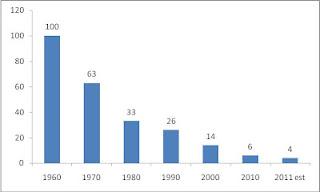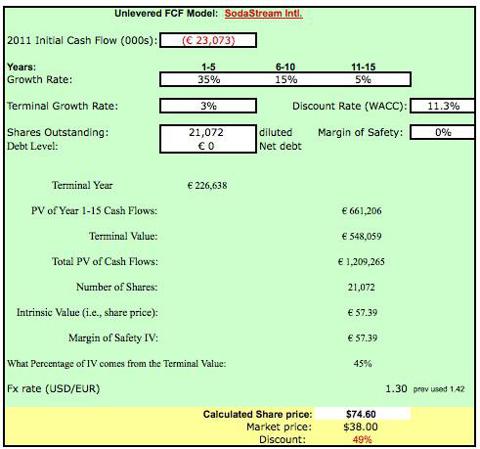Here's an interesting, innovative, relative newcomer to our SRI list. It is brought to you by Climate Counts, an independent, non-profit organization which aims to raise public awareness of ethical consumption. Climate Counts produces a "score card" or list of companies' impact on climate/sustainability.
Companies are rated on their practices to reduce global warming. Scoring is from 0 to 100 (best). The list is located at the bottom of this article with comments from us. Climate uses 22 criteria to evaluate companies, which are broken-down into four categories. Please refer to its website for additional information.
Overall, trends have been good, with companies getting higher scores, on average since 2007's first scorecard. Generally, larger companies (revenue-wise) attain better scorecards/ratings (see chart below). Only one large company (Amazon.com) has had consistently low rankings. We are disappointed that the company, which is so innovative and a good place to work, has not been forward leaning in terms of the environment. We have verified this with other sources, including CSRhub.
What industries performed best?
The Electronics industry performed best compared to the 16 broad sectors evaluated. Siemens scored best, while sadly, Apple scored worst. Steve Jobs, as many of you know, is best known for inspiring his workers and make products that people love, but he was never known as being particularly charitable or being into the environment. Let's hope new leadership moves the company forward.
Sector leaders: Our Comments on right
Airlines: Delta (56)
Apparel/Accessories: Nike (85) Co. gets high rankings on most lists
Beverages - Beer: Molson Coors (69)
Commercial Banks: Bank of America (82) Will the Occupy movement agree?
Consumer Shipping: UPS (80)
Electronics: Hewlett-Packard (83) Co. gets high rankings on most lists
Food Products: Unilever (88)
Food Services: Starbucks (70) A true leader in so many aspects
Home/Furnishings: Herman Miller, and Masco (63)
Hotels: Marriott (73)
Household Prod: L’Oreal (78) Several European cos represented
Large Appliances: AB Electrolux (80) ""
Internet/Software: Microsoft (68)
Media: General Electric (77) Expect to move to another industry
Pharmaceuticals: AstraZeneca (86)
Toys: Hasbro (52) Mattel typically makes most SRI lists
Companies are rated on their practices to reduce global warming. Scoring is from 0 to 100 (best). The list is located at the bottom of this article with comments from us. Climate uses 22 criteria to evaluate companies, which are broken-down into four categories. Please refer to its website for additional information.
Overall, trends have been good, with companies getting higher scores, on average since 2007's first scorecard. Generally, larger companies (revenue-wise) attain better scorecards/ratings (see chart below). Only one large company (Amazon.com) has had consistently low rankings. We are disappointed that the company, which is so innovative and a good place to work, has not been forward leaning in terms of the environment. We have verified this with other sources, including CSRhub.
 |
| source: Climate Counts |
What industries performed best?
The Electronics industry performed best compared to the 16 broad sectors evaluated. Siemens scored best, while sadly, Apple scored worst. Steve Jobs, as many of you know, is best known for inspiring his workers and make products that people love, but he was never known as being particularly charitable or being into the environment. Let's hope new leadership moves the company forward.
What we like:
- Climate Counts is quite innovative in its presentation and approach and is very adept at visual presentation of results.
- The organization attempts to equalize the differences in industries given the very nature of some industries being large energy users/emissions emitters. Thus, it attempts to adjust the jet-fuel using airline industry with others. (We are not sure how it does this or if he actually succeeds in creating a "level playing field.")
- Climate released an iphone app (link) allowing consumers to check-up on companies before making an ill-advised decision.
- Climate Counts is very attuned to the recent trend of "Greenwashing" where companies make themselves look good in public, while doing something quite different "behind the scenes."
What we don't like:
- Two board members of Climate Counts are from Stonyfield Farms (the guys that make yogurt). Stonyfield ranks high on Climate Counts' scorecard, so there may be a conflict-of-interest issue
- In 2010, Climate Counts established a fee-based program to aid companies in achieving their climate goals. Again, this may be seen as a conflict of interest.
- The list is mostly large, well known consumer companies. Other companies are not well represented. As of 2011, Climate examined 150 (global) companies within 16 major consumer sectors.
- The scorecard focuses on the "E/environmental" in ESG. So, SRI investors are only seeing one side of the coin with Climate Counts' list.
Sector leaders: Our Comments on right
Airlines: Delta (56)
Apparel/Accessories: Nike (85) Co. gets high rankings on most lists
Beverages - Beer: Molson Coors (69)
Commercial Banks: Bank of America (82) Will the Occupy movement agree?
Consumer Shipping: UPS (80)
Electronics: Hewlett-Packard (83) Co. gets high rankings on most lists
Food Products: Unilever (88)
Food Services: Starbucks (70) A true leader in so many aspects
Hotels: Marriott (73)
Household Prod: L’Oreal (78) Several European cos represented
Large Appliances: AB Electrolux (80) ""
Internet/Software: Microsoft (68)
Media: General Electric (77) Expect to move to another industry
Pharmaceuticals: AstraZeneca (86)
Toys: Hasbro (52) Mattel typically makes most SRI lists






